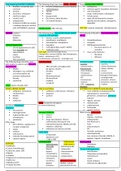Drug impairing GLUCOSE TOLERANCE The following drugs may cause urinary retention: Drugs causing LUNG FIBROSIS
thiazides, furosemide (less tricyclic antidepressants (amitriptyline) amiodarone
common) anticholinergics cytotoxic agents: busulphan, bleomycin
steroids opioids anti-rheumatoid
tacrolimus, ciclosporin NSAIDs drugs: methotrexate, sulfasalazine
interferon-alpha Disopyramide nitrofurantoin
nicotinic acid GA, benzos, Alpha-blockers ergot-derived dopamine receptor
antipsychotics Ca channel blockers agonists (bromocriptine, cabergoline,
b-blockers (mildly) (w caution pergolide)
in diabetics because interfere
with AUTONOMIC response) Candida causes: ABX, Steroids DRY EYES: amytrip, bisoprolol, chlorphenamine
ASTHMA cautions: The following drugs may worsen seizure control The following medications may exacerbate heart
- b blockers in patients with epilepsy: failure:
- NSAIDs alcohol, cocaine, amphetamines
- Adenosine ciprofloxacin, levofloxacin thiazolidinediones
aminophylline, theophylline verapamil
Postural Hypotension bupropion NSAIDs/glucocorticoids
- all anti-hypertensive (in CKD methylphenidate (used in ADHD) o low-dose aspirin is an
stop ACE/ARB last) mefenamic acid exception
- alpha blockers Liver dysfx: paracetamol (high doses), class I antiarrhythmics
- insulin -[haloperidol, isoniazid, NSAIDS, ABX, Antiepileptics, o flecainide
- levodopa statins – autoimmune <1%] o diltiazem
- TCA, isosorbide -{methotrexate, amiodarone – prolonged use}
The following drugs should be used HYPOKALAEMIA HYPONATRAEMIA HYPERNATRAEMIA
with caution in patients with ischaemic - diuretics - Diuretics.
heart disease: - ABX: penicillin, aminoglycoside, - anticonvulsants - - Sodium bicarbonate.
NSAIDs - B2 agonist: inhalers carbamazepine - Sodium chloride.
oestrogens: e.g. combined - Diuretics - COX2 inhibitors - Lithium
oral contraceptive pill, - Insulin - Temazepam - Corticosteroids.
hormone replacement - Mineralocorticoid - Sulphonylureas Androgens/Oestrogens.
- PPI - aminoglycoside
therapy - Glucocorticoid
- Desmopressin - phenytoin, ethanol,
varenicline - Laxatives
- Oxytocin -vasopressin, lactulose
- verapamil
- SSRI – citalopram, - cisplatin
GOUT: aspirin, thiazide, ACEi fluoxetine
AVOID in RENAL FAILURE Safe in renal failure ACCUMULATE in KIDNEYS (need adjusting)
antibiotics: tetracycline, antibiotics: erythromycin, rifampicin most antibiotics including penicillin,
nitrofurantoin diazepam cephalosporins, vancomycin,
NSAIDs warfarin gentamicin, streptomycin, dalteparin
lithium (reduce)
metformin digoxin, atenolol
Brady: bisoprolol and digoxin methotrexate
Harmful in PREGNANCY (ca channel blockers) sulphonylureas
Antibiotics furosemide
tetracyclines opioids (reduce)
aminoglycosides Worsens PSORIASIS Meds causing CONFUSION
sulphonamides and trauma - Benzos
trimethoprim alcohol - Opioids - morphine
quinolones drugs: beta blockers, lithium, - Antipsychotics
Other drugs antimalarials (chloroquine and - Anti-Parkinson’s
ACE inhibitors, angiotensin II hydroxychloroquine), NSAIDs and ACE - TCAs
receptor antagonists inhibitors, infliximab - Anticonvulsants
statins withdrawal of systemic steroids - PPI
warfarin - Penicillin, quinolones
Loose stool:
sulfonylureas - metoclopramide
- lansoprazole
retinoids (including topical) - Less common: (Steroids, NSAIDs, B-
- Alendronic acid
cytotoxic agents blockers, Digoxin, Cimetidine)
- C ABX (c diff)
HYPERKALAMIA Parkinsonism Ankle swelling
Diarrhoea: - Spironolactone (bilat tremor) - Amlodipine
• Antibiotics - ACEI/ARB - Metoclopramide - Naproxen
• Cancer chemotherapy - Digoxin - Haloperidol Causes of hypoglycaemia
• Colchicine, statin, SSRI - Heparin - chlorpromazine - Beta-blockers
• Digoxin Trimethoprim - cinnarizine - Cibenzoline and quinidine
• Laxatives - Cotrimoxazole - antipsychotics - Indomethacin
• Magnesium-containing antacids - Ciclosporin, - insulin
• Metformin tacrolimus NO NO! in Liver Fail: - SGLT2 inhibitors
• NSAIDS and PPI - NSAIDS NSAIDS, codeine, - Sulfonylureas (gliclazide)
• Thiazide diuretics. - B blockers paracetamol 6h max
, SURGERY? GIVE OR STOP?
GIVE
• All “cardiac” or blood pressure drugs EXCEPT the ones listed below.
All epilepsy or Parkinsons drugs
All asthma drugs or inhalers
All tablets which reduce gastric acid (omeprazole, lansoprazole, ranitidine)
All thyroid drugs
All major and minor tranquilisers, which are taken regularly at home. Also
antidepressants and nicotine patches.
All steroids taken regularly, including inhalers
All immunosuppressants and cancer drugs (e.g. azathioprine, tamoxifen)
All analgesics can be given before surgery - EXCEPT NSAID’S (see below)
OMIT
ACE inhibitors (ramipril, enalapril, perindopril, captopril) – 1 week before
Angiotensin 2 antagonists (candesartan, losartan) – 1 week before
All diuretics (frusemide, bumetanide, Bendroflumethiazide, amiloride, spironolactone). The anaesthetist may request that these
are given – this will be on an individual basis. – 1 week before
Diabetic treatment (alternative diabetic treatment must be arranged with Dr). (STOP on Day of surgery)
Aspirin, clopidogrel, dipyridamole, warfarin. You must be familiar with the individual requirements of your surgical team. These
drugs must NOT be stopped in patients who have a coronary stent without prior discussion with an anaesthetist or cardiologist.
Drugs which are not essential in the short term. e.g. vitamins, iron, laxatives, osteoporosis treatment, liquid antacid medicines
(e.g. Gaviscon), HRT, anti- histamines, herbal remedies or homeopathic medicines. (ASPIRIN 1 week before)
Lithium should be omitted.
Non-steroidal anti-inflammatory drugs (e.g. diclofenac (voltarol), indomethacin, ibuprofen), unless prescribed by an anaesthetist
as a pre-med.
Warfarin
Omit 5 days before elective surgery (If INR > 1.5 on day before surgery – give low dose Vit K 5mg)
Bridging needed only in high-risk clotting patients (Metallic heart valves, recent VTE (and now emergency surgery that
can’t be delayed)
Fluid rules
- 2 sweet and 1 salty
o 5% Glucose 1L + 20mmol K+ (8 hours each)
o 0.9% NaCl 1L + 20mmol K+ (8 hours)
- Maintenance:
o Kg x 30 = y
o y/24h = rate
- Which fluid?
o Diarrhoea and vomiting, NG aspirates, stomas, burns, pancreatitis, sepsis
o These should be replaced with a fluid which is similar that is similar to ECF/similar to plasma
Hartmann’s
0.9% Sodium Chloride
o Dehydration/total water loss/Poor intake Classes of shock
Dextrose-saline Shoc Fluid lost Signs
o Blood loss k
Blood or gelofusine Class
- Shock: STAT (15minutes) 1 0.75L (15%) Minimal, mild
- Fluid challenge rules: tachycardia
o Adult = 250/500mls over 10 mins 2 0.75-1.5L (15- Moderate tachycardia,
o Child = 20ml/kg over 10 mins 30%) CRT > 2s
3 1.5-2L (30-40%) Severe tachycardia and
hypotension and
confusion
4 > 2L (> 40%) Critical tachycardia and
hypotension





